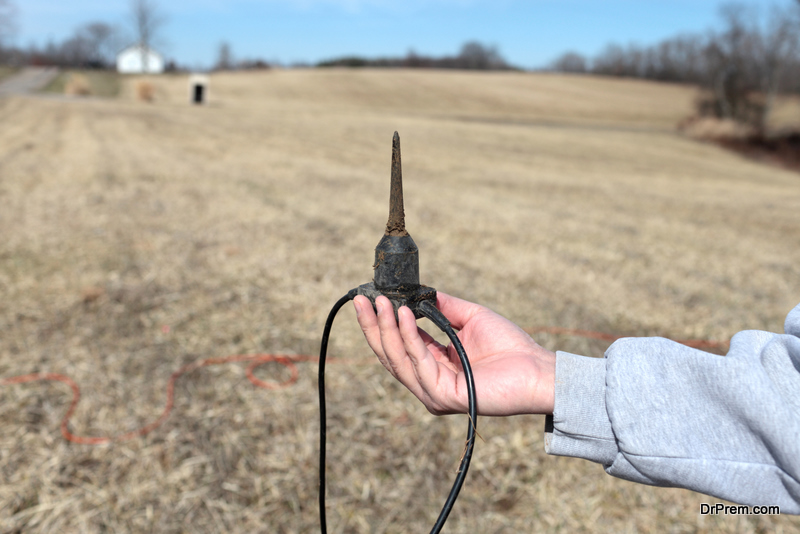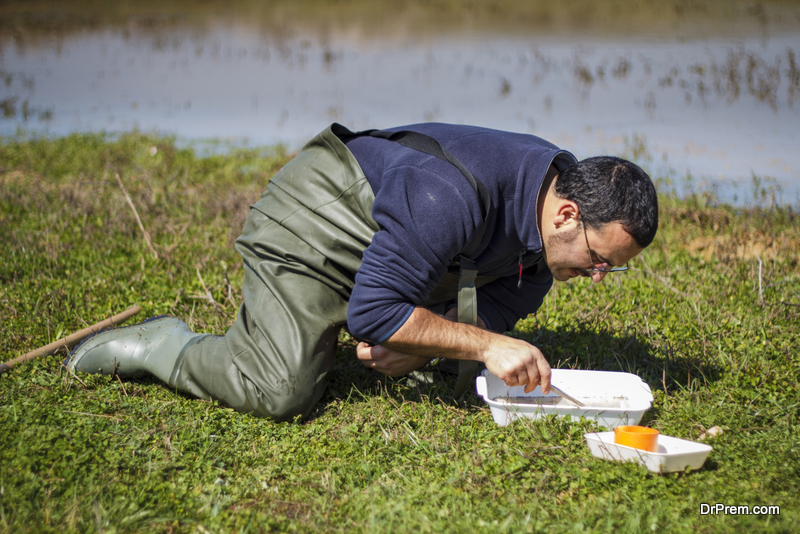There are a growing number of people that care about the planet and are concerned about the future of the world. This isn’t surprising; the eco movement has come on in leaps and bounds since from being a fairly niche group of passionate devotees in the 60’s to being mainstream in many countries. As a result, there is a growing demand for careers that contribute to a sustainable future – i.e. careers that help to provide a living without taking anything away from the world.
Jobs that are included in this industry are incredibly diverse – there are scientific careers available; those involved in renewable energy; and those who just want to help their fellow members of society in a constructive way. A sustainable career doesn’t even have to be one that sacrifices money – it’s very possible to make a great salary without destroying the earth. So, if you’re looking to start a career in a field that you love that benefits the world that you love, take a look at this list to get some ideas and start your future planning.
1. Agroforester
 Agroforestry is a new and important system of forestry.It tackles agriculture – trying to make it more sustainable. Agriculture in many places in the world is deeply incompatible with forests and woodlands, both of which are vastly important to the biodiversity of temperate regions. For example, soy is one of the world’s core supplies of proteins. Vegans and vegetarians will find it hard to avoid this widespread bean, but as will almost any meat-eater as it’s the leading source of protein for poultry, pigs and even fish. Soy is also the second most responsible cause of deforestation – especially in the Amazon, where football pitches worth of jungle are being destroyed every few minutes to make space for soy crops.
Agroforestry is a new and important system of forestry.It tackles agriculture – trying to make it more sustainable. Agriculture in many places in the world is deeply incompatible with forests and woodlands, both of which are vastly important to the biodiversity of temperate regions. For example, soy is one of the world’s core supplies of proteins. Vegans and vegetarians will find it hard to avoid this widespread bean, but as will almost any meat-eater as it’s the leading source of protein for poultry, pigs and even fish. Soy is also the second most responsible cause of deforestation – especially in the Amazon, where football pitches worth of jungle are being destroyed every few minutes to make space for soy crops.
Agroforesters tackle this significant and dangerous issue by devising ways to grow crops in and around forests that they preserve. This creates a more sustainable way of managing both valuable woodlands and necessary crops. The job of an agroforester can range from being purely theoretical (like researching combinations of trees and crops that can contribute to the soil mineral content necessary for both to thrive) or purely practical (going out there and planting the crops and trees themselves). Coffee is something that’s being targeted by agroforesters, who are improving the quality and yields of coffee by growing it in the shade beneath trees.
2. Nurse or Doctor
Nurses and doctors don’t contribute to the health of the planet, but they do contribute to a sustainable society. The recent few months have demonstrated the importance of good doctors and especially good nurses, who have been pushed to the limit in many countries that are now expecting a devastating shortage (e.g. in the United Kingdom).
Online nurse practitioner programs are an excellent solution to these shortages. By promoting or engaging in online nurse practitioner courses, both the short term nurse shortage and the long-term problem of sustainable human health (did you know that life expectancy is actually going down?). Learning the essentials of being a nurse can also be highly valuable in small eco-communities, boots-on-ground activism and more. Doing online nurse practitioner programs, like the one at the University of Texas Arlington, is also an efficient way of working towards a future career – people taking online nurse practitioner programs typically gain 650 hours of clinical experience and can continue working while they complete the program in as little as 2.5 years. Online nurse practitioner programs also give the option to learn pharmacology, family care, care of women and more.
3. Geophysical Engineer
 Geophysical engineers are the individuals that are responsible for mining. Mining is something that rarely goes hand-in-hand with sustainability, but geophysical engineers have the power to make the practice as sustainable as possible (and there’s a growing sustainability movement in mining). It’s unlikely for there to be a future where human beings can make do without, cobalt for example, so it’s very important for the preservation of planet earth for the people doing the mining to at least be responsible.
Geophysical engineers are the individuals that are responsible for mining. Mining is something that rarely goes hand-in-hand with sustainability, but geophysical engineers have the power to make the practice as sustainable as possible (and there’s a growing sustainability movement in mining). It’s unlikely for there to be a future where human beings can make do without, cobalt for example, so it’s very important for the preservation of planet earth for the people doing the mining to at least be responsible.
Geophysical engineers are responsible for studying mining sites and designing safe and efficient ways to extract resources from the site. There’s a lot of wastage that goes into mining, so a geophysical engineer that cares about the environment will reduce that waste, find sustainable ways of approaching the problem and even make their boss more money in the process. Geophysical engineers are an example of a sustainable career-path that can make a lot of money if they’re good, but they do need to study. Unlike doing online nurse practitioner programs, geophysical engineers have to be on the ground and get a bachelor’s degree from an ABET-certified program before getting an official license.
4. Social Enterprise Entrepreneur
The capitalist society that we live in seems to be showing us that you can’t have progress without decimating the environment. Social enterprise entrepreneurs would argue that the only way for a capitalist, progress-driven society to continue would be by finding ways for capitalism to work symbiotically with the environment, instead of being exploitative of the environment. Social enterprise engineers can do anything – from trying to reduce carbon emissions by finding innovative ways to capture CO and CO2 to finding ways to upcycle food waste into something that can reenter the food cycle. Being a social enterprise entrepreneur is another career path that can be quite lucrative but, unlike online nurse practitioner programs, they don’t need any formal training – online or otherwise (though it likely helps).
5. Water Resource Engineer
 There are lots of serious scientists that are predicting wars over water in the near future. This makes sense – humans have always fought over resources that become limited and, as the population grows and climate change makes clean water more of a rarity, of course water will be one of those resources. If this is a future that terrifies you, you should become a water resource engineer. These engineers function similarly to other environmental engineers but with a focus on water. The water in question can be water sourced either above or below ground, and water resource engineers will manage and assess the quality and quantity of water in these instances. This could be via modeling or simulating how the water naturally flows, or it could also be by coming up with ways to divert natural water flows to regions that need it.
There are lots of serious scientists that are predicting wars over water in the near future. This makes sense – humans have always fought over resources that become limited and, as the population grows and climate change makes clean water more of a rarity, of course water will be one of those resources. If this is a future that terrifies you, you should become a water resource engineer. These engineers function similarly to other environmental engineers but with a focus on water. The water in question can be water sourced either above or below ground, and water resource engineers will manage and assess the quality and quantity of water in these instances. This could be via modeling or simulating how the water naturally flows, or it could also be by coming up with ways to divert natural water flows to regions that need it.
Currently, water resource engineers have a big presence in disaster areas, where they try to mitigate disasters like hurricanes or floods. The normal activities that a water resource engineer undertakes, however, could be designing flow systems, developing plans, looking over important construction work and more. Water resource engineers are likely to be extremely well paid in the future, when fresh water becomes one of the most valuable resources. You can get into this field by doing a civil engineering training, which like online nurse practitioner programs can be started online.
6. Wind Energy Engineer
If you have an engineering mind and you love to solve problems but also enjoy exciting work – you might want to consider being a wind energy engineer. This field of engineering involves doing all the work that goes behind putting up wind farms – whether that’s sitting in the office and making specifications or actually going out there and looking for the windiest parts of the world to put up wind farms. If you’re a boots-on-ground wind energy engineer, you should hopefully like thrills because you’ll get them when you install a wind turbine.
You’ll need to scale great heights, as well as withstand high winds while working on complicated electric components. If you’re taking a step back and working on the design of wind farms, making them efficient is a challenge that will leave you feeling highly satisfied upon completion. The satisfaction of being an engineer and solving problems can only be enhanced by making a significant contribution towards the clean energy sector.
7. Ecotourism Guide
 Ecotourism is a different career path to the other options here. Some people don’t want to spend years in school – that’s not appropriate for everybody. If you want to live a more relaxed but still greatly enjoyable life, being an ecotourism guide has its perks. It’s one of the fastest growing global travel sectors and if you love to travel then this would probably be for you.
Ecotourism is a different career path to the other options here. Some people don’t want to spend years in school – that’s not appropriate for everybody. If you want to live a more relaxed but still greatly enjoyable life, being an ecotourism guide has its perks. It’s one of the fastest growing global travel sectors and if you love to travel then this would probably be for you.
Ecotourism guides arrange trips as well as educational experiences to help people enjoy mother nature in a sustainable way, as well as contribute to the health of indigenous communities and their culture and beliefs. You might find yourself immersed in environments across the globe or just working from a location of your choosing and doing the planning which goes into it. Being an ecotourism guide doesn’t require any formal training, but it’s great if you have some people skills and enjoy contributing to the health of the planet on a small but satisfying scale.
8. Aquatic Biologist
Aquatic biologists are specialist biologists. They work with life wherever it involves large amounts of water – whether that’s working in wetlands, oceans, streams or ponds. Unlike marine biologists, they can study fresh water systems instead of just ocean life. Aquatic biologists are key informers to the scientific world about how global warming is impacting freshwater ecosystems, as well as how pollution is causing damage to aquatic environments and how species need to be protected. They can study almost anything aquatic, though – including water composition and even plankton genetics! They may otherwise go into education, consultancy and more, but do require a scientific and educated background. Though, like online nurse practitioner programs, this can be done over time and via a computer.
9. Environmental PR
 PR involves having a great understanding of how the media works, so that you can interact with it on behalf of clients. This can involve great creativity (as any fan of Nathan Fielder’s Nathan for You will be able to tell you), but when you specialize in environmental PR you will also feel the satisfaction of doing something that enhances the world you live in. Getting people aware of important issues is vital in the fight against significant sustainability issues like climate change; education is one of the most important tenets of activism. When you do environmental PR you will be able to educate not just individuals but the public via media outlets, as well as local businesses. You might have to ensure that all persons in your society are aware of environmental regulations, as well as their importance. You’ll likely work in an office and many environmental PR firms state that they are especially favorable to employees who have a background in environmental law, but that’s not a requirement.
PR involves having a great understanding of how the media works, so that you can interact with it on behalf of clients. This can involve great creativity (as any fan of Nathan Fielder’s Nathan for You will be able to tell you), but when you specialize in environmental PR you will also feel the satisfaction of doing something that enhances the world you live in. Getting people aware of important issues is vital in the fight against significant sustainability issues like climate change; education is one of the most important tenets of activism. When you do environmental PR you will be able to educate not just individuals but the public via media outlets, as well as local businesses. You might have to ensure that all persons in your society are aware of environmental regulations, as well as their importance. You’ll likely work in an office and many environmental PR firms state that they are especially favorable to employees who have a background in environmental law, but that’s not a requirement.
10. Teacher
Teachers are a vital part of our society and have a significant impact on the future of the planet. That’s because they’re the ones who are responsible with educating the next generation about the realities of the environmental crisis that the world is facing. Many teachers feel constrained by the curriculum they have to teach, but if they just set a good example and do their best to educate their class about the importance of caring for the environment, they will make a very significant impact, especially if you consider how many children they will teach over their whole career. It’s a noble profession, but not always the highest paid; however, teachers do enjoy an excellent job satisfaction rating, and touch many people’s lives in very significant ways.
Whatever way you want to contribute to the sustainability of the planet and our society, you will be able to find something that will give you not only a comfortable or exciting way of life, but something that makes you go home at the end of the day and feel good about your contribution to the world. Many of these jobs do also involve time for activism – whether that’s writing a blog about your aquatic biological findings or participating in protests while you’re doing your online nurse practitioner programs. However, you want to live your life, you are in a position where you will be able to do so without hurting the planet and that’s a great life to live.
Article Submitted By Community Writer




